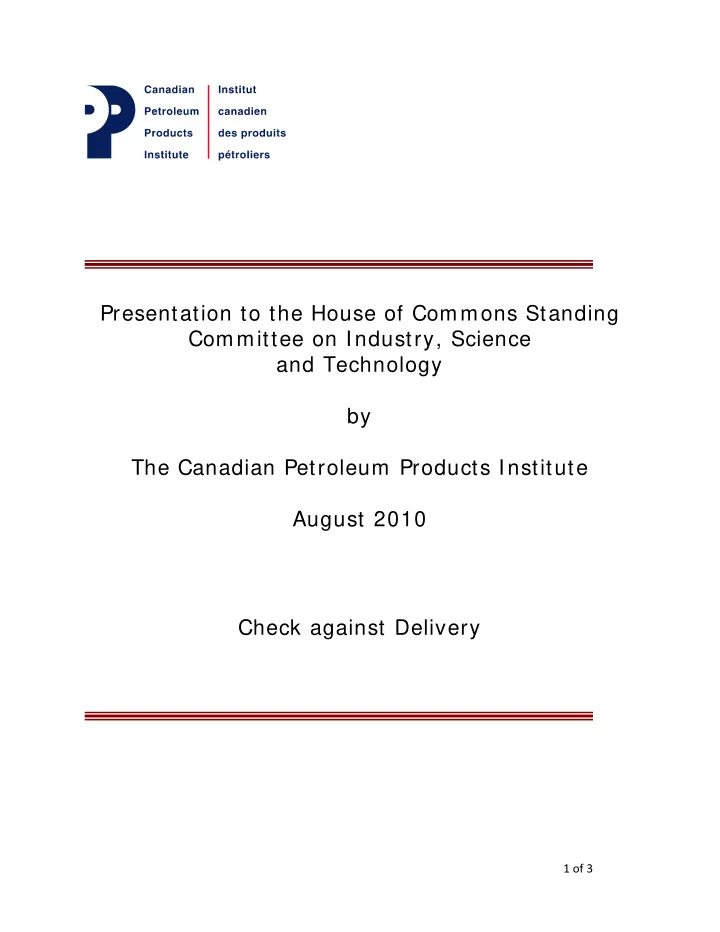

Presentation to the House of Commons Standing Committee on Industry, Science and Technology by The Canadian Petroleum Products Institute August 2010 Check against Delivery 1 of 3
Presentation by Mr. Peter Boag to the Standing Committee on Industry, Science and Technology – Bill C-14 “Fairness at the Pumps” Good morning Mr. Chair (Hon. Michael Chong) and committee members. As president of the Canadian Petroleum Products Institute, I want to thank you for the opportunity to be here today to share the views of the Institute on Bill C-14. With me today is M. Carol Montreuil, Vice President of the Institute’s Eastern Canada Division. The Canadian Petroleum Products Institute is the national association representing the public policy interests of the downstream petroleum industry for all aspects of petroleum refining, distribution, transportation and marketing of petroleum products for transportation, home energy and industrial uses. Collectively, CPPI member companies operate 17 refineries representing 80 per cent of Canadian refining capacity, and supply some 10,000 branded stations with transportation fuels across Canada. CPPI members include Chevron Canada Limited, Husky Energy, Imperial Oil Limited, North Atlantic Refining Limited, Parkland Income Fund, Shell Canada Products, Suncor Energy Products Inc. (marketing under Petro-Canada), and Ultramar Limited. At the outset, I want to emphasize that CPPI and its members are committed to the principle that consumers should get what they pay for. CPPI members operate with the highest levels of integrity and have developed trust with their customers by providing full value for quality and reliable energy products. The Voluntary Periodic Certification Program’s recommended Device Certification Frequency for gasoline pumps is 2 years. CPPI members take this voluntary program and its recommended pump inspection frequency seriously. In some cases annual inspection cycles are the norm, with even more frequent inspections occurring at high volume locations. Routine reconciliations between inventory readings and sales records are also used to identify the need for non- scheduled systematic verification/calibration of pumps. I want to take this opportunity to reinforce remarks made by Measurement Canada officials when they appeared before this Committee last week. The retail petroleum sector has a very high compliance rate with Measurement Canada standards – 94% for gasoline pumps over a 10 year period. In 2007, the compliance rate, as reported in the Canwest story referenced by Measurement Canada last week, was 97%. Moreover, Measurement Canada officials confirmed that the calibration error threshold is low - 0.5% - that’s a cup of fuel on a 50 litre fill- up – and that there was no evidence to suggest that calibration errors are the result of intentional actions on the part of fuel retailers. This is an important point to make in the context of some of the public commentary on the issue at the time C-14 was first tabled. The last point I would like to make refers to the short title of C-14 – the Fairness of the Pumps Act. Given that the act amends both the Electricity & Gas Inspection Act and the Weights & Measures Act, and is applicable to a broad range of trade sectors, I would respectfully suggest that the Committee consider recommending a change in the Bill’s name to better reflect this broad application. 2 of 3
I would conclude by again reaffirming our members’ position that consumers should get what they pay for. Thank you for your attention. Mr. Montreuil and I would be happy to take your questions. 3 of 3
Recommend
More recommend